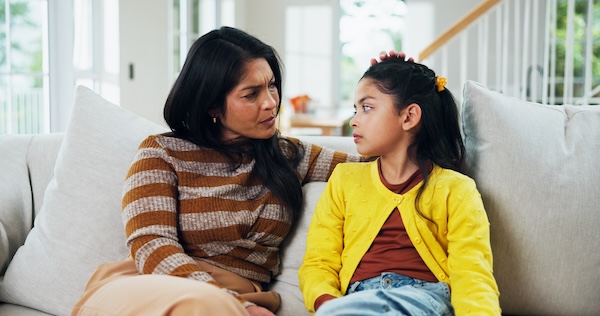Drag
Select
Call Now
How to help a child with ADHD
Kid
Parent
Teen

As a parent, you may have experienced moments where your child's behaviors, like lack of focus or hyperactivity, left you wondering if it is part of their natural exuberance or something more. If you've found yourself asking, "How do I know if my child has ADHD?" you're not alone.
ADHD symptoms, testing, diagnoses, and support can be overwhelming to navigate, so the team at Bend is here to help you better understand everything there is to know about ADHD in children.
ADHD definition
ADHD is an acronym for attention deficit hyperactivity disorder, which is a chronic condition that affects millions of people. According to the CDC, it’s one of the most common neurodevelopmental disorders of childhood. It’s often diagnosed in childhood and can continue throughout someone’s life well into adulthood.
What does ADHD mean
There is a difference between having an attention deficit and being distracted. ADHD is a neurodevelopmental condition in which a person’s brain has difficulty compartmentalizing or separating different tasks, thoughts, or emotions from others. When someone struggles with separating their thoughts and tasks, they may have trouble focusing, act impulsively, feel overwhelmed, and have difficulty managing their emotions. They might also seem hyperactive at times.
Most kids can struggle with being disorganized, are forgetful, have difficulty prioritizing tasks, avoid responsibility, and can be prone to making mistakes. What separates living with ADHD from simply “being easily distracted” is when a child’s symptoms consistently impede their ability to be successful at school or maintain relationships.
{{famcgchld="/blogcomponents"}}
ADHD can show up in many ways and change over time. Kids with ADHD may have a hard time:
- Knowing when to focus on small details and when to focus on the bigger picture
- Holding a train of thought when they’re interrupted
- Concentrating on one activity at a time
- Following directions
ADHD symptoms in kids
Every child is different, but here is a list of common signs and symptoms of ADHD:
- Inattention: While it's normal for children to occasionally daydream or lose focus, persistent difficulty staying on task, following instructions, or completing activities may be signs of ADHD.
- Hyperactivity: Children are naturally energetic, but excessive and uncontrollable hyperactivity that disrupts daily activities, such as constantly fidgeting, running around excessively, or climbing on furniture, could be a sign of ADHD.
- Impulsivity: Children with ADHD may struggle with impulse control, acting without thinking about the consequences. Look for signs of impulsivity, such as interrupting others, blurting out answers, or engaging in risky behavior without considering the potential dangers.
- Organization and time management challenges: While forgetfulness and disorganization are common in children, those with ADHD may struggle more significantly. Behaviors may include chronic forgetfulness, losing items frequently, and difficulty completing tasks on time.
Ways to help a child with ADHD
- Practice mindfulness. Help your child find calm and ground themselves by tapping into their senses. Ask them to take a few deep breaths and name one thing they smell, one thing they see, one thing they hear, one thing they taste, and one thing they are touching.
- Get creative. Have your child process their thoughts through writing, drawing, or creating. Try to ask open-ended questions and listen intentionally as they express themselves.
- Create lists. Building routines and structure to limit surprising or overwhelming situations can be a huge help. If your child has a tough time getting out the door for school in the morning, work together to write a step-by-step list of their routine. This can include getting out of bed, having breakfast, brushing their teeth, etc. Then, post it somewhere, like a bathroom mirror, where they can look at it daily.
- Implement screen boundaries. Limit the amount of time they spend watching television, or using a computer or a phone. Instead encourage outdoor activities, movement, or sports to improve, focus, social skill and physical health.
How to get support for your child with ADHD
If your family is struggling with how to navigate ADHD, it can be a huge relief to find support from behavioral coaching and social skill management experts.
A clinical support team can help your child learn the strategies needed to make positive choices when they feel overwhelmed, as well as help them foster healthy relationships with themselves and others.
As a parent, you deserve support too! Mental health practitioners can help you gain better insight into your child’s behavior, teach you how to positively guide them through neurodevelopmental challenges, and join you in advocating for their needs. It can also be a good idea to engage the whole family in care to help everyone better communicate, set consistent routines and implement strategies to support your child’s development as they grow.
We also have a team of licensed practitioners at Bend that can help you figure out the next steps, along with day-to-day tools to help make life easier for you and your child, so feel free to reach out for diagnostic information and support.
Remember that there is nothing wrong with your child if they have difficulty focusing, and it does not necessarily mean that they have attention deficit hyperactivity disorder (ADHD). And if they do have ADHD, there is still nothing wrong with them! At Bend, we’re all about acceptance, meeting your kiddo where they’re at and empowering you to support them in the ways that work best for them.




